Memoir of Eric Francis Maher, 1945 - Part 1
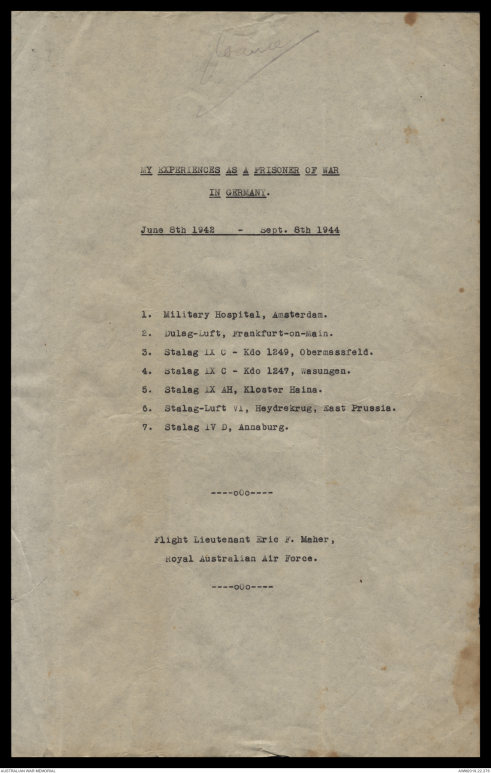
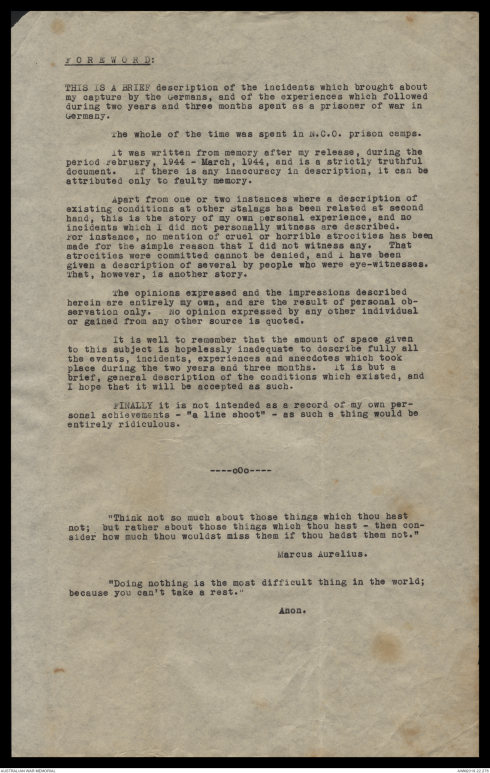
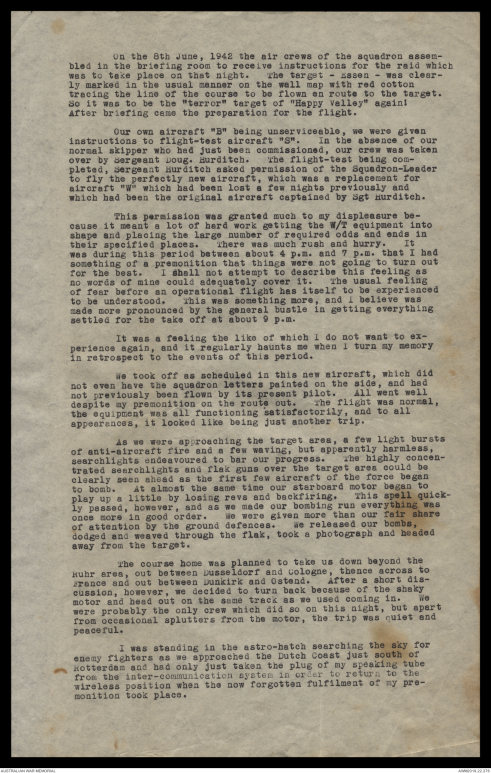
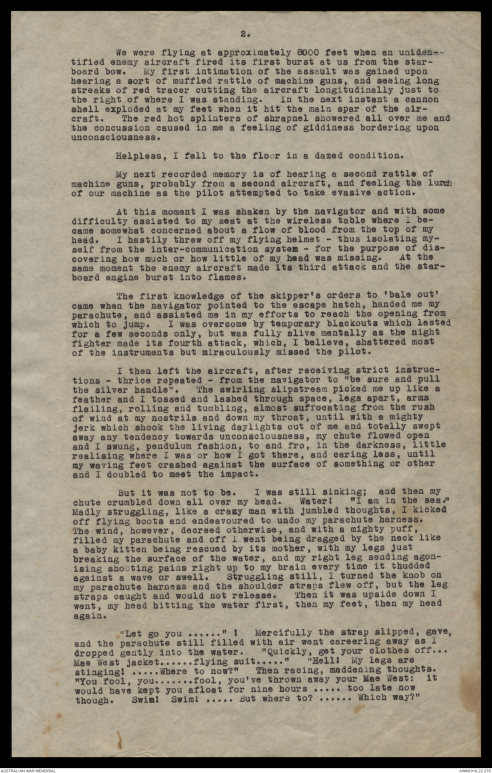
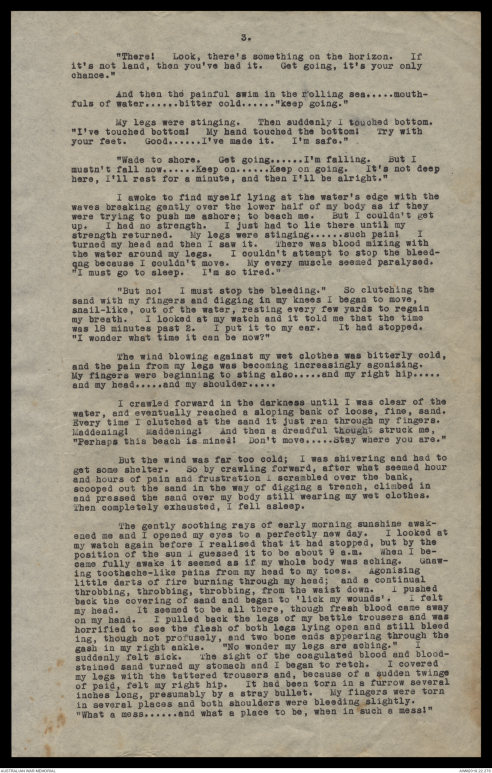
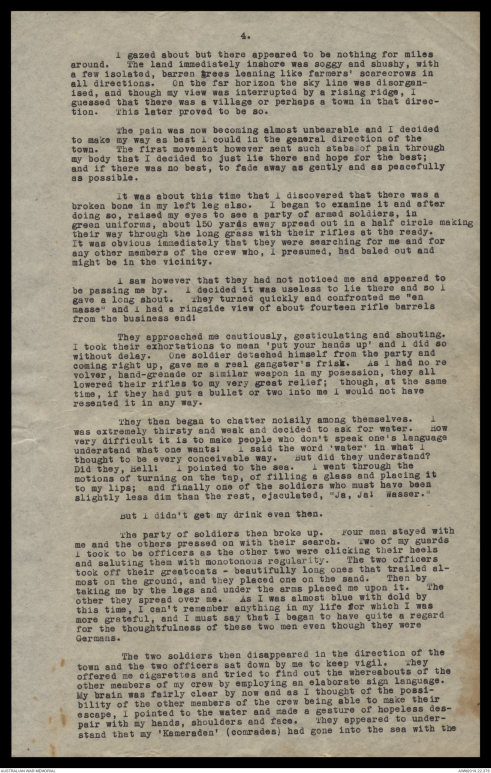
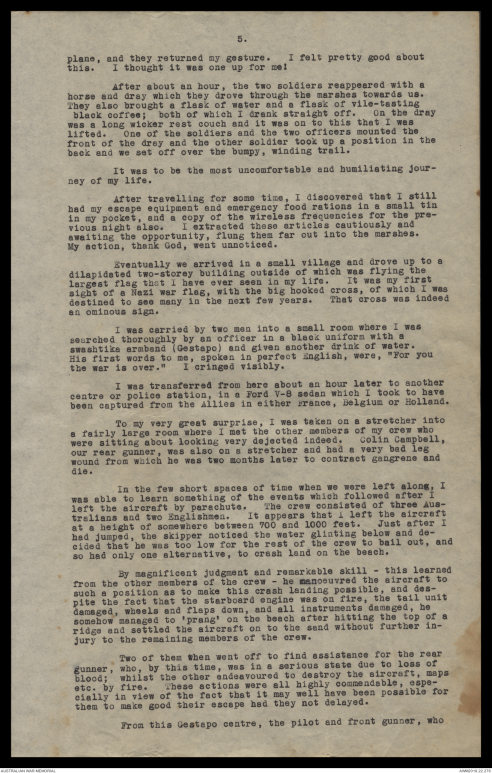
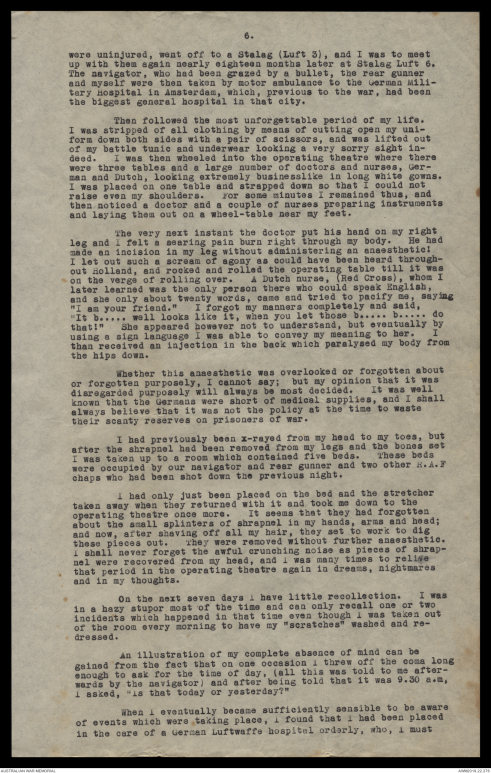
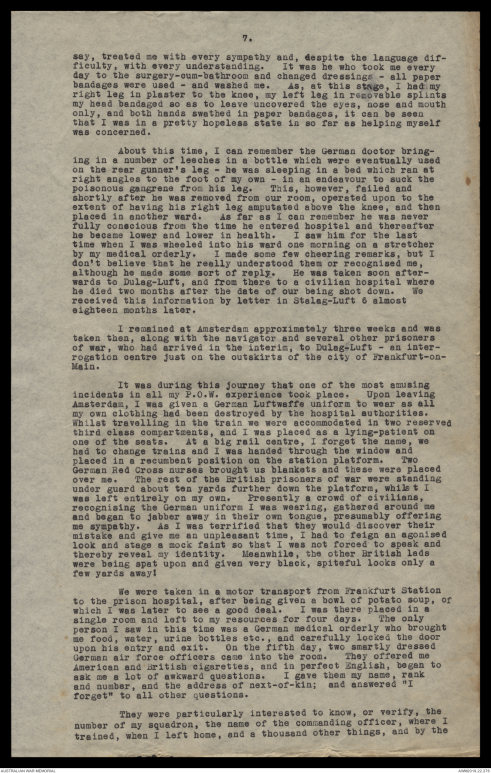
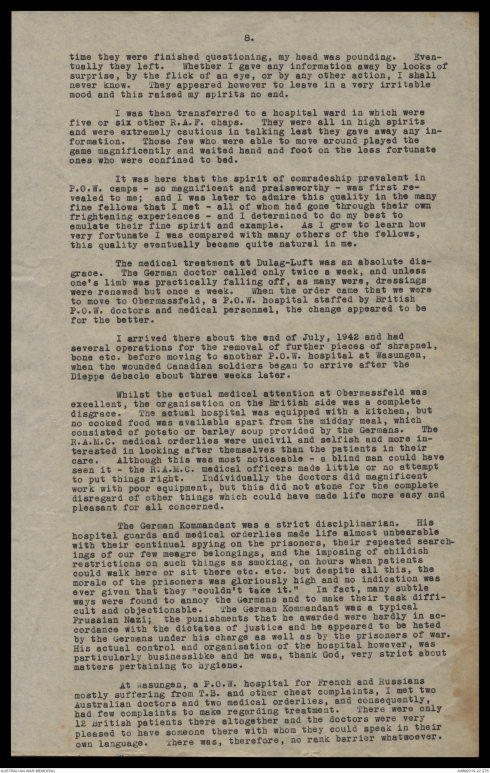
France
MY EXPERIENCES AS A PRISONER OF WAR
IN GERMANY.
June 8th 1942 - Sept. 8th 1944
- Military Hospital, Amsterdam.
- Dulag-Luft, Frankfurt-on-Main.
- Stalag IX C - Kdo 1249, Obermassfeld.
- Stalag IX C - Kdo 1247, Wasungen.
- Stalag IX AH, Kloster Haina.
- Stalag-Luft VI, Heydrekrug, East Prussia.
- Stalag IV D, Annaburg.
Flight Lieutenant Eric F. Maher,
Royal Australian Air Force.
FOREWORD:
THIS IS A BRIEF description of the incidents which brought about
my capture by the Germans, and of the experiences which followed
during two years and three months spent as a prisoner of war in
Germany.
The whole of the time was spent in N.C.O. prison camps.
It was written from memory after my release, during the
period February, 1944 - March, 1944, and is a strictly truthful
document. If there is any inaccuracy in description, it can be
attributed only to faulty memory.
Apart from one or two instances where a description of
existing conditions at other Stalags has been related at second
hand, this is the story of my own personal experience, and no
incidents which I did not personally witness are described.
For instance, no mention of cruel or horrible atrocities has been
made for the simple reason that I did not witness any. That
atrocities were committed cannot be denied, and I have been
given a description of several by people who were eye-witnesses.
That, however, is another story.
The opinions expressed and the impressions described
herein are entirely my own, and are the result of personal
observation only. No opinion expressed by any other individual
or gained from any other source is quoted.
It is well to remember that the amount of space given
to this subject is hopelessly inadequate to describe fully all
the events, incidents, experiences and anecdotes which took
place during the two years and three months. It is but a
brief, general description of the conditions which existed, and
I hope that it will be accepted as such.
FINALLY it is not intended as a record of my own personal
achievements - "a line shoot" - as such a thing would be
entirely ridiculous.
"Think not so much about those things which thou hast
not; but rather about those things which thou hast - then consider
how much thou wouldst miss them if thou hadst them not."
Marcus Aurelius.
"Doing nothing is the most difficult thing in the world;
because you can't take a rest."
Anon.
On the 8th June, 1942 the air crews of the squadron assembled
in the briefing room to receive instructions for the raid which
was to take place on that night. The target - Essen - was clearly
marked in the usual manner on the wall map with red cotton
tracing the line of the course to be flown en route to the target.
So it was to be the "terror" target of "Happy Valley" again!
After briefing came the preparation for the flight.
Our own aircraft "B" being unserviceable, we were given
instructions to flight-test aircraft "S". In the absence of our
normal skipper who had just been commissioned, our crew was taken
over by Sergeant Doug. Hurditch. The light-test being completed,
Sergeant Hurditch asked permission of the Squadron-Leader
to fly the perfectly new aircraft, which was a replacement for
aircraft "W" which had been lost a few nights previously and
which had been the original aircraft captained by Sgt Hurditch.
This permission was granted much to my displeasure because
it meant a lot of hard work getting the W/T equipment into
shape and placing the large number of required odds and ends in
their specified places. There was much rush and hurry. It
was during this period between about 4 p.m. and 7 p.m. that I had
something of a premonition that things were not going to turn out
for the best. I shall not attempt to describe this feeling as
no words of mine could adequately cover it. The usual feeling
of fear before an operational flight has itself to be experienced
to be understood. This was something more, and I believe was
made more pronounced by the general bustle in getting everything
settled for the take off at about 9 p.m.
It was a feeling the like of which I do not want to experience
again, and it regularly haunts me when I turn my memory
in retrospect to the events of this period.
We took off as scheduled in this new aircraft, which did
not even have the squadron letters painted on the side, and had
not previously been flown by its present pilot. All went well
despite my premonition on the route out. The flight was normal,
the equipment was all functioning satisfactorily, and to all
appearances, it looked like being just another trip.
As we were approaching the target area, a few light bursts
of anti-aircraft fire and a few waving, but apparently harmless,
searchlights endeavoured to bar our progress. The highly concentrated
searchlights and flak guns over the target area could be
clearly seen ahead as the first few aircraft of the force began
to bomb. At almost the same time our starboard motor began to
play up a little by losing revs and backfiring. This spell quickly
passed, however, and as we made our bombing run everything was
once more in good order. We were given more than our fair share
of attention by the ground defences. We released our bombs,
dodged and weaved through the flak, took a photograph and headed
away from the target.
The course home was planned to take us down beyond the
Ruhr area, out between Dusseldorf and Cologne, thence across to
France and out between Dunkirk and Ostend. After a short discussion,
however, we decided to turn back because of the shaky
motor and head out on the same track as we used coming in. We
were probably the only crew which did so on this night, but apart
from occasional splutters from the motor, the trip was quiet and
peaceful.
I was standing in the astro-hatch searching the sky for
enemy fighters as we approached the Dutch Coast just south of
Rotterdam and had only just taken the plug of my speaking tube
from the inter-communication system in order to return to the
wireless position when the now forgotten fulfilment of my premonition
took place.
2.
We were flying approximately 8000 feet when an unidentified
enemy aircraft fired its first burst at us from the starboard
bow. My first intimation of the assault was gained upon
hearing a sort of muffled rattle of machine guns, and seeing long
streaks of red tracer cutting the aircraft longitudinally just to
the right of where I was standing. In the next instant a cannon
shell exploded at my feet when it hit the main spar of the aircraft.
The red hot splinters of shrapnel showered all over me and
the concussion caused in me a feeling of giddiness bordering upon
unconsciousness.
Helpless, I fell to the floor in a dazed condition.
My next recorded memory is of hearing a second rattle of
machine guns, probably from a second aircraft, and feeling the lurch
of our machine as the pilot attempted to take evasive action.
At this moment I was shaken by the navigator and with some
difficulty assisted to my seat at the wireless table where I became
somewhat concerned about a flow of blood from the top of my
head. I hastily threw off my flying helmet - thus isolating myself
from the inter-communication system - for the purpose of discovering
how much or how little of my head was missing. At the
same moment the enemy aircraft made its third attack and the starboard engine burst into flames.
The first knowledge of the skippers' orders to 'bale out'
came when the navigator pointed to the escape hatch, handed me my
parachute, and assisted me in my efforts to reach the opening from
which to jump. I was overcome with temporary blackouts which lasted
for a few seconds only, but was fully alive mentally as the night
fighter made its fourth attack, which, I believe, shattered most
of the instruments but miraculously missed the pilot.
I then left the aircraft, after receiving strict instructions
- thrice repeated - from the navigator to "be sure and pull
the silver handle". The swirling slipstream picked me up like a
feather and I tossed and lashed through space, legs apart, arms
flailing, rolling and tumbling, almost suffocating from the rush
of wind at my nostrils and down my throat, until with a mighty
jerk which shook the living daylights out of me and totally swept
away any tendency towards unconsciousness, my chute flowed open
and I swung, pendulum fashion, to and fro, in the darkness, little
realising where I was or how I got there, and caring less, until
my waving feet crashed against the surface of something or other
and I doubled to meet the impact.
But it was not to be. I was still sinking; and then my
chute crumbled down all over my head.. Water! "I am in the sea."
Madly struggling, like a crazy man with jumbled thoughts, I kicked
off flying boots and endeavoured to undo my parachute harness.
The wind, however, decreed otherwise, and with a mighty puff,
filled my parachute and off I went being dragged by the neck like
a baby kitten being rescued by its mother, with my legs just
breaking the surface of the water, and my right leg sending agonising
shooting pains right up to my brain every time it thudded
against a wave or swell. Struggling still, I turned the knob on
my parachute harness and the shoulder straps flew off, but the leg
straps caught and would not release. Then it was upside down I
went, my head hitting the water first, then my feet, then my head
again.
"Let go you......." ! Mercifully the strap slipped, gave,
and the parachute will filled with air went careering away as I
dropped gently into the water. "Quickly, get your clothes off....
Mae West jacket....... flying suit......" "Hell! My legs are
stinging! ........ Where to now?" Then racing, maddening thoughts.
"You fool, you........fool, you've thrown away your Mae West! It
would have kept you afloat for nine hours ...... too late now
though. Swim! Swim! ...... But where to? .... Which way?"
3.
"There! Look, there's something on the horizon. If
it's not land, then you've had it. Get going, it's your only
chance."
And then the painful swim in the rolling sea......mouthfuls
of water........bitter cold........."keep going."
My legs were stinging. Then suddenly I touched the bottom.
"I've touched bottom! My hand touched the bottom! Try with
your feet. Good.......I've made it . I'm safe."
"Wade to shore. Get going......I'm falling. But I
mustn't fall now.......Keep on......Keep on going. It's not deep
here, I'll rest for a minute, and then I'll be alright."
I awoke to find myself lying at the water's edge with the
waves breaking gently over the lower half of my body as if they
were trying to push me ashore; to beach me. But I couldn't get
up. I had no strength. I just had to lie there until my
strength returned. My legs were stinging.......such pain! I
turned my head and then I saw it. There was blood mixing with
the water around my legs. I couldn't attempt to stop the bleeding
because I couldn't move. My every muscle seemed paralysed.
"I must go to sleep. I'm so tired."
"But no! I must stop the bleeding." So clutching the
sand with my fingers and digging in my knees I began to move,
snail-like, out of the water, resting every few yards to regain
my breath. I looked at my watch and it told me that the time
was 18 minutes past 2. I put it to my ear. It had stopped.
"I wonder what the time it can be now?"
The wind blowing against my wet clothes was bitterly cold,
and the pain from my legs was becoming increasingly agonising.
My fingers were beginning to sting also......and my right hip.....
and my head.....and my shoulder......
I crawled forward in the darkness until I was clear of the
water, and eventually reached a sloping bank of loose, fine, sand.
Every time I clutched at the sand it just ran through my fingers.
Maddening! Maddening! And then a dreadful thought struck me,
"Perhaps this beach is mined! Don't move.......Stay where you are."
But the wind was far too cold; I was shivering and had to
get some shelter. So by crawling forward, after what seemed hour
and hours of pain and frustration I scrambled over the bank,
scooped out the sand in the way of digging a trench, climbed in
and pressed the sand over my body still wearing my wet clothes.
Then completely exhausted, I fell asleep.
The gently soothing rays of early morning sunshine awakened
me and I opened my eyes to a perfectly new day. I looked at
my watch again before I realised that it had stopped, but by the
position of the sun I guessed it to be about 9 a.m. When I became
fully awake it seemed as if my whole body was aching. Gnawing
toothache-like pains from my head to my toes. Agonising
little darts of fire burning through my head; and a continual
throbbing, throbbing, throbbing from the waist down. I pushed
back the covering of sand and began to 'lick my wounds'. I felt
my head. It seemed to be all there, though fresh blood came away
on my hand. I pulled back the legs of my battle trousers and was
horrified to see the flesh of both my legs lying open and still bleeding,
though not profusely, and two bone ends appearing through the
gash in my right ankle. "No wonder my legs were aching." I
suddenly felt sick. The sight of the coagulated blood and blood-stained
sand turned my stomach and I began to retch. I covered
my legs with tattered trousers and, because of a sudden twinge
of paid, felt my right hip. It had been torn in a furrow several
inches long, presumably by a stray bullet. My fingers were torn
in several places and both shoulders were bleeding slightly.
"What a mess.....and what a place to be, when in such a mess!"
4.
I gazed about but there appeared to be nothing for miles
around. The land immediately inshore was soggy and shushy, with
a few isolated, barren trees leaning like farmers' scarecrows in
all directions. On the far horizon the sky line was disorganised,
and though my view was interrupted by a rising ridge, I
guessed that there was a village or perhaps a town in that direction.
This later proved to be so.
The pain was now becoming almost unbearable and I decided
to make my way as best I could in the general direction of the
town. The first movement however sent such stabs of pain through
my body that I decided to just lie there and hope for the best;
and if there was no best, to fade away as gently and as peacefully
as possible.
It was about this time that I discovered that there was a
broken bone in my left leg also. I began to examine it and after
doing so, raised my eyes to see a party of armed soldiers, in
green uniforms, about 150 yards away spread out in a half circle making
their way through the long grass with their rifles at the ready.
It was obvious immediately that they were searching for me and for
any other members of the crew who, I presumed, had baled out and
might be in the vicinity.
I saw however that they had not noticed me and appeared to
be passing me by. I decide it was useless to lie there and so I
gave a long shout. They turned quickly and confronted me "en
masse" and I had a ringside view of about fourteen rifle barrels
from the business end!
They approached me cautiously, gesticulating and shouting.
I took their exhortations to mean 'put your hands up' and I did so
without delay. One soldier detached himself from the party and
coming right up, and gave me a real gangster's frisk. As I had no revolver,
hand-grenade or similar weapon in my possession, they all
lowered their rifles to my very great relief; though, at the same
time, if they had put a bullet or two into me I would not have
resented it in any way.
They then began to chatter noisily among themselves. I
was extremely thirsty and weak and decided to ask for water. How
very difficult it is to make people who don't speak one's language
understand what one wants! I said the word 'water' in what I
thought to be every conceivable way. But did they understand?
Did they, Hell! I pointed to the sea. I went through the
motions of turning on the tap, of filling a glass and placing it
to my lips; and finally one of the soldiers who must have been
slightly less dim than the rest, ejaculated, "Ja, Ja! Wasser."
But I didn't get my drink even then.
The party of soldiers then broke up. Four men stayed with
me and the others pressed on with their search. Two of my guards
I took to be officers as the other two were clicking their heels
and saluting them with monotonous regularity. The two officers
took off their greatcoats - beautifully long ones that trailed almost
on the ground, and they placed one on the sand. Then by
taking me by the legs and under the arms placed me upon it. The
other they spread over me. As I was almost blue with cold by
this time, I can't remember anything in my life for which I was
more grateful, and I must say that I began to have quite a regard
for the thoughtfulness of these two men even though they were
Germans.
The two soldiers then disappeared in the direction of the
town and the two officers sat down by me to keep vigil. They
offered me cigarettes and tried to find out the whereabouts of the
other members of my crew by employing an elaborate sign language.
My brain was fairly clear by now and as I thought of the possibility
of the other members of the crew being able to make their
escape, I pointed to the water and made a gesture of hopeless despair
with my hands, shoulders and face. They appeared to understand
that my 'Kameraden' (comrades) had gone into the sea with the
5.
plane, and they returned my gesture. I felt pretty good about
this. I thought it was one up for me!
After about an hour, the two soldiers reappeared with a
horse and dray which they drove through the marshes towards us.
They also brought a flask of water and a flask of vile-tasting
black coffee; both of which I drank straight off. On the dray
was a long wicker rest couch and it was on to this that I was
lifted. One of the soldiers and the two officers mounted the
front of the dray and the other soldier took up position in the
back and we set off over the bumpy, winding trail.
It was to be the most uncomfortable and humiliating journey
of my life.
After travelling for some time, I discovered that I still
had my escape equipment and emergency food rations in a small tin
in my pocket, and a copy of the wireless frequencies for the previous
night also. I extracted these articles cautiously and
awaiting the opportunity, flung them far out into the marshes.
My action, thank God, went unnoticed.
Eventually we arrived in a small village and drove up to a
dilapidated two-storey building outside of which was flying the
largest flag that I have ever seen in my life. It was my first
sight of a Nazi war flag, with the big hooked cross, of which I was
destined to see many in the next few years. That cross was indeed
an ominous sign.
I was carried by two men into a small room where I was
searched thoroughly by an officer in a black uniform with a
swashtika armband (Gestapo) and given another drink of water.
His first words to me, spoken in perfect English, were, "For you
the war is over." I cringed visibly.
I was transferred from here about an hour later to another
centre or police station, in a Ford V-8 sedan which I took to have
been captured from the Allies in either France, Belgium or Holland.
To my very great surprise, I was taken on a stretcher into
a fairly large room where I met the other members of my crew who
were sitting about very dejected indeed. Colin Campbell,
our rear gunner, was also on a stretcher and had a very bad leg
wound from which he was two months later to contract gangrene and
die.
In the few short spaces of time when we were left along, I
was able to learn something of the events which followed after I
left the aircraft by parachute. The crew consisted of three Australians
and two Englishmen. It appears that I left the aircraft
at a height of somewhere between 700 and 1000 feet. Just after I
had jumped, the skipper noticed the water glinting below and decided
that he was too low for the rest of the crew to bail out, and
so had only one alternative, to crash land on the beach.
By magnificent judgement and remarkable skill - this learned
from the other members of the crew - he manoeuvred the aircraft to
such a position as to make this crash landing possible, and despite
the fact that the starboard engine was on fire, the tail unit
damaged, wheels and flaps down, and all instruments damaged, he
somehow managed to 'prang' on the beach after hitting the top of a
ridge and settled the aircraft on to the sand without further injury
to the remaining members of the crew.
Two of them then went off to find assistance for the rear
gunner, who, by this time, was in a serious state due to loss of
blood; whilst the other endeavoured to destroy the aircraft, maps,
etc. by fire. These actions were all highly commendable, especially
in view of the fact that it may well have been possible for
them to make good their escape had they not delayed.
From this Gestapo centre, the pilot and front gunner, who
6.
were uninjured, went off to a Stalag (Luft 3), and I was to meet
up with them again nearly eighteen months later at Stalag Luft 6.
The navigator, who had been grazed by a bullet, the rear gunner
and myself were taken by motor ambulance to the German Military
Hospital in Amsterdam, which, previous to the war, had been
the biggest general hospital in that city.
Then followed the most unforgettable period of my life.
I was stripped of all clothing by means of cutting open my uniform
down both sides with a pair of scissors, and was lifted out
of my battle tunic and underwear looking a very sorry sight indeed.
I was then wheeled into the operating theatre where there
were three tables and a large number of doctors and nurses, German
and Dutch, looking extremely businesslike in long white gowns.
I was placed on one table and strapped down so that I could not
raise even my shoulders. For some minutes I remained thus, and
then noticed a doctor and a couple of nurses preparing instruments
and laying them out on a wheel-table near my feet.
The very next instant the doctor put his hand on my right
leg and I felt a searing pain burn right through my body. He had
made an incision in my leg without administering an anaesthetic!
I let out such a scream of agony as could have been heard throughout
Holland, and rocked and rolled the operating table till it was
on the verge of rolling over. A Dutch nurse, (Red Cross), whom I
later learned was the only person there who could speak English,
and she only about twenty words, came and tried to pacify me, saying
"I am your friend." I forgot my manners completely and said,
"It b...... well looks like it, when you let those b...... b...... do
that!" She appeared however not to understand, but eventually by
using a sign language I was able to to convey my meaning to her. I
then received an injection in the back which paralysed my body from
the hips down.
Whether this anaesthetic was overlooked or forgotten about
or forgotten purposely, I cannot say; but my opinion that it was
disregarded purposely will always be most decided. It was well
known that the Germans were short of medical supplies, and I shall
always believe that it was not the policy at the time to waste
their scanty reserves on prisoners of war.
I had previously been x-rayed from my head to my toes, but
after the shrapnel had been removed from my legs and the bones set
I was taken up to a room which contained five beds. These beds
were occupied by our navigator and rear gunner and two other R.A.F
chaps who had been shot down the previous night.
I had only just been placed on the bed and the stretcher
taken away when they returned with it and took me down to the
operating theatre once more. It seems that they had forgotten
about the small splinters of shrapnel in my hands, arms and head;
and now, after shaving off all my hair, they set to work to dig
these pieces out. They were removed without further anaesthetic.
I shall never forget the awful crunching noise as pieces of shrapnel
were recovered from my head, and I was many times to relive
that period in the operating theatre again in dreams, nightmares
and in my thoughts.
On the next seven days I have little recollection. I was
in a hazy stupor most of the time and can only recall one or two
incidents which happened in that time even though I was taken out
of the room every morning to have my "scratches" washed and redressed.
An illustration of my complete absence of mind can be
gained from the fact that on one occasion I threw off the coma long
enough to ask for the time of day, (all this was said to me afterwards
by the navigator) and after being told that it was 9.30 a.m,
I asked, "is it today or yesterday?"
When I eventually became sufficiently sensible to be aware
of events which were taking place, I found that I had been placed
in the care of a German Luftwaffe hospital orderly, who, l must
7.
say, treated me with every sympathy and, despite the language difficulty,
with every understanding. It was he who took me every
day to the surgery-cum-bathroom and changed dressings - all paper
bandages were used - and washed me. As, at this stage, I had my
right leg in plaster to the knee, my left leg in removable splints
my head bandaged so as to leave uncovered the eyes, nose and mouth
only, and both hands swathed in paper bandages, it can be seen
that I was in a pretty hopeless state in so far as helping myself
was concerned.
About this time, I can remember the German doctor bringing
in a number of leeches in a bottle which were eventually used
on the rear gunner's leg - he was sleeping in a bed which ran at
right angles to the foot of my own - in an endeavour to suck the
poisonous gangrene from his leg. This, however, failed and
shortly after he was removed from our room, operated upon to the
extent of having his right leg amputated above the knee, and then
placed in another ward. As far as I can remember he was never
fully conscious from the time he entered hospital and thereafter
he became lower and lower in health. I saw him for the last
time when I was wheeled into his ward one morning on a stretcher
by my medical orderly. I made some few cheering remarks, but I
don't believe that he really understood them or recognised me,
although he made some sort of reply. He was taken soon afterwards
to Dulag-Luft, and from there to a civilian hospital where
he died two months after the date of our being shot down. We
received this information by letter in Stalag-Luft 6 almost
eighteen months later.
I remained at Amsterdam approximately three weeks and was
taken then, along with the navigator and several other prisoners
of war, who had arrived in the interim, to Dulag-Luft - an interrogation
centre just on the outskirts of the city of Frankfurt-on-Main.
It was during this journey that one of the most amusing
incidents in all my P.O.W. experience took place. Upon leaving
Amsterdam, I was given a German Luftwaffe uniform to wear as all
my own clothing had been destroyed by the hospital authorities.
Whilst travelling in the train we were accommodated in two reserved
third class compartments, and I was placed as a lying-patient on
one of the seats. At a big rail centre, I forget the name, we
had to change trains and I was handed through the window and
placed in a recumbent position on the station platform. Two
German Red Cross nurses brought us blankets and these were placed
over me. The rest of the British prisoners of war were standing
under guard about ten yards further down the platform, whilst I
was left entirely on my own. Presently a crowd of civilians,
recognising the German uniform I was wearing, gathered around me
and began to jabber away in their own tongue, presumably offering
me sympathy. As I was terrified that they would discover their
mistake and give me an unpleasant time, I had to feign an agonised
look and stage a mock faint so that I was not forced to speak and
thereby reveal my identity. Meanwhile, the other British lads
were being spat upon and given very black, spiteful looks only a
few yards away!
We were taken in a motor transport from Frankfurt Station
to the prison hospital, after being given a bowl of potato soup, of
which I was later to see a good deal. I was there placed in a
single room and left to my resources for four days. The only
person I saw in this time was a German medical orderly who brought
me food, water, urine bottles etc., and carefully locked the door
upon his entry and exit. On the fifth day, two smartly dressed
German air force officers came into the room. They offered me
American and British cigarettes, and in perfect English, began to
ask me a lot of awkward questions. I gave them my name, rank
and number, and the address of next-of-kin; and answered "I
forget" to all other questions.
They were particularly interested to know, or verify, the
number of my squadron, the name of the commanding officer, where I
trained, when I left home, and a thousand other things, and by the
8.
time they were finished questioning, my head was pounding. Eventually
they left. Whether I gave any information away by looks of
surprise, by the flick of an eye, or by any other action, I shall
never know. They appeared however to leave in a very irritable
mood and this raised my spirits no end.
I was then transferred to a hospital ward in which were
five or six other R.A.F. chaps. They were all in high spirits
and were extremely cautious in talking lest they gave away any information.
Those few who were able to move around played the
game magnificently and waited hand and foot on the less fortunate
ones who were confined to bed.
It was here that the spirit of comradeship prevalent in
P.O.W. camps - so magnificent and praiseworthy - was first revealed
to me; and I was later to admire this quality in the many
fine fellows that I met - all of whom had gone through their own
frightening experiences - and I determined to do my best to
emulate their fine spirit and example. As I grew to learn how
very fortunate I was compared with many others of the fellows,
this quality eventually became quite natural in me.
The medical treatment at Dulag-Luft was an absolute disgrace.
The German doctor called only twice a week, and unless
one's limb was practically falling off, as many were, dressings
were renewed but once a week. When the order came that we were
to move to Obermassfeld, a P.O.W. hospital staffed with British
P.O.W. doctors and medical personnel, the change appeared to be
for the better.
I arrived there about the end of July, 1942 and had
several operations for the removal of further pieces of shrapnel,
bone etc. before moving to another P.O.W. hospital at Wasungen,
when the wounded Canadian soldiers began to arrive after the
Dieppe debacle about three weeks later.
Whilst the actual medical attention at Obermassfeld was
excellent, the organisation on the British side was a complete
disgrace. The actual hospital was equipped with a kitchen, but
no cooked food was available apart from the midday meal, which
consisted of potato or barley soup provided by the Germans. The
R.A.M.C. medical orderlies were uncivil and selfish and more interested
in looking after themselves than the patients in their
care. Although this was most noticeable - a blind man could have
seen it - the R.A.M.C. medical officers made little or no attempt
to put things right. Individually the doctors did magnificent
work with poor equipment, but this did not atone for the complete
disregard of other things which could have made life more easy and
pleasant for all concerned.
The German Kommandant was a strict disciplinarian. His
hospital guards and medical orderlies made life almost unbearable
with their continual spying on the prisoners, their repeated searchings
of our few meagre belongings, and the imposing of childish
restrictions on such things as smoking, on hours when patients
could walk here or sit there etc. etc. but despite all this, the
morale of the prisoners was gloriously high and no indication was
ever given that they "couldn't take it." In fact, many subtle
ways were found to annoy the Germans and to make their task difficult
and objectionable. The German Kommandant was a typical
Prussian Nazi; the punishments that he awarded were hardly in accordance
with the dictates of justice and he appeared to be hated
by the Germans under his charge as well as by the prisoners of war.
His actual control and organisation of the hospital however, was
particularly businesslike and he was, thank God, very strict about
matters pertaining to hygiene.
At Wasungen, a P.O.W. hospital for French and Russians
mostly suffering from T.B. and other chest complaints, I met two
Australian doctors and two medical orderlies, and consequently,
had few complaints to make regarding treatment. There were only
12 British patients there altogether and the doctors were very
pleased to have someone there with whom they could speak in their
own language. There was, therefore, no rank barrier whatsoever.
 Sam scott
Sam scottThis transcription item is now locked to you for editing. To release the lock either Save your changes or Cancel.
This lock will be automatically released after 60 minutes of inactivity.